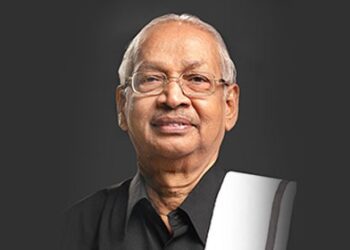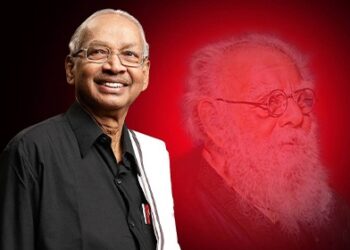Mohit Palagiri
Rationalist Writer
Visakhapatnam
This September 17, 2024, marks the 146th anniversary of Periyar E.V.Ramasamy (1879-1973), a man who has influenced me. In this article, I will share the few points which attracted me to this philosophy and consider it to be more ideal than any other philosophy.
Personal Experiences: From a young age, I developed a deep aversion to oppression due to personal experiences that shaped my worldview. My habit of reading, particularly in the fields of history and politics, intensified as I sought to understand the roots of injustice. This journey led me to explore various movements and revolutionaries, and among them, Periyar stood out as a beacon of inspiration.
As a non-Tamilian, my initial knowledge of Periyar was limited; I knew him only as a social reformer and feminist. When I was 12, I heard about a Telugu movie that depicted his life, but it wasn’t until I was 17 that I actually watched it. Just as Ben Kingsley’s portrayal of Gandhi brought the leader’s story to a global audience, this Telugu movie brought Periyar’s ideas closer to my community. The film deeply resonated with me, motivating me to delve deeper into his works. Through reading his books, I found that Periyar’s ideology was not just another “ism”, but a comprehensive and flexible philosophy rooted in Humanism, Rationalism, Libertarianism, Progressivism, Social Liberalism, and Democratic Socialism.
Uniqueness of Periyar: Periyar (originally named, Ramasamy), is a revolutionary-philosopher without formal education or a degree, stands alongside figures like Benjamin Franklin, Voltaire, George Bernard Shaw, and Thomas Paine . However, unlike these other personalities, who received formal education in organized schools, Periyar had only five years of informal education in a small verandah before being sent to work in trading business of his father. Periyar was a self-learner, and he continued to educate himself throughout his life. He kept himself informed about current affairs, technology, history, world events, and much more. Periyar spoke five languages, English, Tamil, Kannada and Telugu fluently. At the age of 86, he visited IBM to see a newly installed computer, approaching it with the curiosity of a young student, demonstrating his unyielding commitment to progress and knowledge.
Uniqueness of Periyar’s ideology: Periyar’s ideology, in short, stands against any form of oppression and aims to remove social evils at their roots. At present, there is a term called intersectionality coined by Kimberle Crenshaw in 1989, which means that oppression in all forms—such as racism, classism, sexism, and casteism—can combine or intersect in the experiences of marginalized groups. For example, In colonial South Africa, a highly racist society, Indians and Blacks faced lower wages and harsher treatment. Those in menial jobs, often filled by these groups, experienced more ghettoization than middle- or upper-class individuals.
I could say Periyar’s ideology has roots in intersectionality before the term intersectionality was coined. He had not focused solely on one form of oppression—be it class, caste, color, etc.—in his protests and writings. He was against every form of oppression present in the world. Unlike others, such as Khadi nationalists, Hindu/Islamic nationalists, or Communists, Periyar did not focus solely on national independence, religion, or economic disparities. Periyar and his followers believed that humans are greater than everything and must be liberated from oppression.
Periyar said, “My common enemy is oppression, and I will stand on the side of the oppressed, including Brahmins too.” Whenever there was a protest with a right cause, Periyar would give his full support, setting aside his political preferences. If any form of discrimination occurred, Periyar would initiate a protest and ensure that the forces of discrimination were brought to an end. He supported and organized protests for everyone, including students, teachers, workers, women, Hindus, Muslims, lower castes, nationalists, communists, and even for the DMK party, despite splitting from it due to ideological differences. Even five days before his death, he delivered a speech on rationalism and emphasized the Fundamental Rights of citizens.
Here are a few movements led by Periyar and the causes behind them: 1.Temple Entry Movement- Periyar, an atheist, fought for temple entry rights for lower-caste Hindus. 2. Nagapattinam Workers’ Strike- He supported the workers during their protest against the Railway Management Workshop. 3. Anti-Hindi Protests 1938- Periyar led protests to defend the Tamil language, earning appreciation from Tamil scholars and students. 4. “Why Women Were Enslaved”: This book by Periyar, published before Bertrand Russell’s “Marriage and Morals,” analyses how women were enslaved in India and outlines a plan to break patriarchy.
Progressive and Futuristic: Periyar was very progressive and futuristic compared to his peers that his progressive views are relevant today. In one of his writings he mentioned “Let us keep our political differences aside and let us work for social justice and social reform.” and when he delivered a speech on Rural Development in Erode, 1944 he mentioned that “My development views are not socialist or communist , but they are progressivist.”
When women were forced to stay at home, Periyar encouraged and advocated education, Western clothing, financial independence and the freedom to make their own choices, including the decision not to marry or have children. Even today, live-in relationships are considered taboo in many big cities, but Periyar advocated for couples to stay together without the interference of marriage. While he did not directly advocate anti-natalism, Periyar advised women not to have children until they were ready physically, mentally, and financially. In his book ‘The World to Come’, he also envisioned societal progress through a cooperative economy, love with consent, test-tube babies, longer lives, and the growth of atheism worldwide. Many of his predictions have since proven to be true and remain relevant today.
Periyar did not adhere to a single idea in every time; he changed his opinions over time for the greater good and did not remain stuck in the same pattern of thinking as he had even a year before. Thus, Periyar’s views evolved better over the years.
I believe that those who cling to their old views without change have a fascist mindset. For example, initially, Periyar suggested that untouchables convert to Islam, believing it could bring equality, though he did not support religion or mythology. However, by the end of the same year, he advocated atheism as the true path to equality, criticizing Islam, Christianity, and Hinduism in his book Vedangalin Vandavalangal and other writings, opposing all religions and dogmas as foolish notions
Rationalism: This is the foundation of Periyar’s life and ideology. He claimed that a man without reason is an animal. In his speeches, he often emphasized reason, urging the masses to recognize that with reason as with reason, we could achieve greater things in life and society. Periyar encouraged people to stop believing in God, religion, ghosts, or other phenomena, and to think with reason rather than following blindly. Periyar championed the rational and scientific movement long before anyone else in India, particularly among the common masses where science was often neglected. He established The Rationalists’ Forum to discuss scientific, educational, and rational topics, and even today, events continue to be conducted under its banner.
In his speeches and writings, he would say, “I do not say that people should believe everything I say. Think. If one is satisfied that what I have said is true and believable, then only should you accept my views.” This reflects the mindset of a great rationalist, echoing the views of rational philosophers like Voltaire, Thomas Paine, Bertrand Russell, B.R. Ambedkar, and Bhagat Singh, who similarly encouraged their followers to think critically.
Conclusion: Periyarism is not bound by specific guidelines or a concrete philosophy. Whether you are a Marxist, Ambedkarite, Leninist, or follow any other ideology, you can appreciate Periyar’s philosophy—and vice versa. Even believers in God accept that Periyar’s work and vision have contributed to Tamil Nadu’s progressive society. This is not a leader-centric organization; we refer to Thiru. Veeramani as “Asiriyar” (meaning “teacher” in Tamil). Periyarism is a futuristic ideology that adapts to changing times and henceforth, LGBTQ rights are first recognized in Tamil Nadu compared to other cities.
Personally, I endorse Democratic Confederalism, Anti-Stalinism, New Leftism, Atatürk’s philosophy, and Keynesian Economics, yet I consider myself a Periyarist. Despite our differences, we all fall under the umbrella of Periyar’s philosophy. Ultimately, Periyar’s main ideology is that every human being is important and must live with self-respect. Henceforth, I am a proud Periyar follower.







